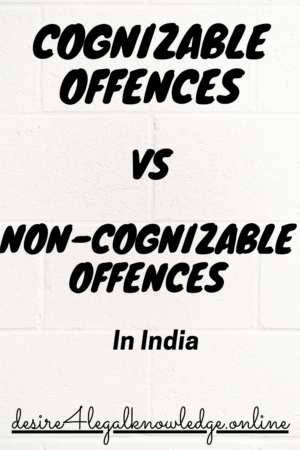An Insight to Cognizable Offenses and Non-Cognizable Offenses
Table of Contents
Introduction to Cognizable and Non-Cognizable Offenses
In the realm of criminal law, offenses are categorized into various types, namely, cognizable offenses and non-cognizable offenses, each carrying distinct legal implications. Understanding the difference between these categories is crucial as it determines the legal procedures, arrest provisions, and overall handling of the criminal case. Cognizable offences are considered more serious in nature, allowing the police to make an arrest without a warrant, while non-cognizable offences require a warrant or court’s permission for an arrest.
This article aims to shed light on the concept of cognizable and non-cognizable offenses, exploring their definitions, key differences, and the implications they hold within the legal framework. By delving into this topic, readers can gain a deeper understanding of the distinctions between these two types of offenses and their significance in the criminal justice system.
What are Cognizable Offenses?
Cognizable offenses, also known as cognizable crimes, refer to criminal offenses that are considered serious in nature and have a significant impact on public order and safety. These offenses are characterized by their severity and potential threat to society, warranting prompt and immediate action by law enforcement agencies. In cognizable offences, the police have the authority to make an arrest without a warrant based on their own discretion or upon receiving a complaint from the victim or a witness.
Characteristics of Cognizable Offenses
Here are some key aspects and characteristics of cognizable offences:
- Severity and Seriousness: Cognizable offenses encompass a wide range of serious crimes that have a substantial impact on individuals, property, or public order. Examples of cognizable offences include murder, rape, robbery, kidnapping, theft, arson, and offenses involving narcotics or arms.
- Police Powers of Arrest: In cognizable offenses, the police have the power to arrest the accused person without a warrant. This enables law enforcement agencies to take immediate action in apprehending the suspect to prevent further harm or to ensure the preservation of evidence.
- First Information Report (FIR): In cognizable offenses, the police are required to register a First Information Report (FIR) based on the complaint received from the victim or a witness. The FIR serves as the official record of the offense and initiates the criminal investigation process.
- Investigation and Police Autonomy: Cognizable offenses grant the police the authority to initiate an investigation on their own without seeking prior permission from the court. The police can gather evidence, interview witnesses, conduct searches, and take other necessary steps to establish the facts of the case.
- Public Safety and Order: Cognizable offences are often associated with a significant threat to public safety and societal order. Swift action and immediate arrest in cognizable cases are crucial to protect potential victims, maintain public order, and ensure the effective functioning of the criminal justice system.
- Stricter Bail Conditions: Bail provisions for cognizable offences are generally stricter compared to non-cognizable offences. The accused may have to satisfy specific conditions, such as providing sureties, depositing a bail amount, or demonstrating that their release will not interfere with the ongoing investigation or pose a threat to society.
- Prosecution and Trial: Once the investigation is complete, the police submit their findings to the relevant prosecuting authority, such as the public prosecutor or the district attorney. The prosecuting authority then decides whether to proceed with the trial based on the evidence gathered during the investigation.


List of Cognizable Offenses
Under Indian law, several offenses are categorized as cognizable offences. Here is a list of some common cognizable offences as per the Indian Penal Code (IPC) and other relevant laws:
- Murder- Section 302 IPC
- Rape- Section 376 IPC
- Kidnapping and abduction- Section 363-373 IPC
- Robbery- Section 392-394 IPC
- Theft- Section 378 IPC
- Dowry death- Section 304B IPC
- Rioting- Section 146-148 IPC
- Unlawful assembly- Section 141 IPC
- Assault causing grievous hurt- Section 325 IPC
- Criminal intimidation- Section 506 IPC
- Offenses related to counterfeit currency- Section 489 IPC
- Offenses under the Narcotic Drugs and Psychotropic Substances Act, 1985
- Offenses under the Arms Act, 1959
- Offenses under the Protection of Children from Sexual Offences (POCSO) Act, 2012
- Offenses related to public servant corruption- Section 7-13, Prevention of Corruption Act, 1988
- Offenses related to cybercrimes, such as hacking, identity theft, and online fraud (under various sections of the Information Technology Act, 2000)
This list is not exhaustive, and there are several other offenses categorized as cognizable under different laws and statutes in India. It is important to consult the relevant laws and legal provisions for a comprehensive understanding of cognizable offences in India.
What are Non-Cognizable Offenses?
Non-cognizable offences, under Indian law, refer to offenses that are considered less serious in nature compared to cognizable offences. These offenses generally do not pose an immediate threat to public safety or require immediate police intervention. In non-cognizable offences, the police cannot make an arrest without a warrant or a court’s permission. These offenses usually involve private disputes or minor violations that do not directly impact public order.
Characteristics of Non-Cognizable Offenses
Non-cognizable offences under Indian law are characterized by several key features. Here are the main characteristics of non-cognizable offences:
- Less Serious Nature: Non-cognizable offences are generally considered less serious compared to cognizable offences. These offenses often involve minor disputes, private conflicts, or offenses that primarily affect individual rights or interests rather than posing a significant threat to public safety or order.
- Police Cannot Make Arrest Without Warrant: One of the primary characteristics of non-cognizable offenses is that the police cannot make an arrest without a warrant or a court’s permission. Unlike in cognizable offences, where the police have the authority to arrest the accused without a warrant, non-cognizable offences require the involvement of the court to initiate an arrest.
- Complaint by the Complainant: In non-cognizable offences, the complainant or the victim plays a crucial role in initiating legal action. The complainant needs to approach the police station and file a complaint or provide a statement regarding the offense. The police record the details but cannot proceed with the investigation without the court’s direction.
- Court Intervention: The court’s intervention is necessary for non-cognizable offences. After receiving the complaint, the police submit the complaint and relevant details to the court. The court reviews the complaint and decides whether to issue a warrant for arrest or order an investigation. The court’s involvement ensures a judicial check and balance before any arrest or investigation takes place.
- Less Stringent Bail Conditions: Non-cognizable offences generally have less stringent bail provisions compared to cognizable offences. The accused person may have a relatively easier time securing bail, depending on the nature of the offense and other factors considered by the court.
- Private Disputes and Individual Rights: Non-cognizable offences often revolve around private disputes, minor breaches of law, or violations of personal rights. These offenses typically involve conflicts between individuals or minor offenses that affect individual interests rather than public order or safety.
It is important to note that the characteristics of non-cognizable offenses may vary depending on the specific legal provisions and jurisdiction. The classification of offenses as cognizable or non-cognizable can differ under different laws and statutes. Therefore, it is essential to refer to the relevant legal provisions and consult legal professionals for accurate information regarding specific non-cognizable offences.


List of Non-Cognizable Offenses
Under Indian law, numerous offenses are categorized as non-cognizable offenses. Here is a list of some common non-cognizable offences:
- Defamation- Section 499 IPC
- Simple assault– Section 352 IPC
- Cheating- Section 415 IPC
- Forgery- Section 463 IPC
- Public nuisance- Section 268 IPC
- Criminal trespass- Section 447 IPC
- Criminal intimidation- Section 506 IPC
- Outraging the modesty of a woman- Section 354 IPC
- Causing hurt not amounting to grievous hurt- Section 323 IPC
- Theft of property below a specified value- Section 379 IPC
- Attempt to commit an offense- Section 511 IPC
- Mischief causing damage below a specified value- Section 427 IPC
- Breach of trust- Section 406 IPC
- House-trespass- Section 448 IPC
- Giving false evidence- Section 191 IPC
- Criminal conspiracy- Section 120B IPC
- Making false statements- Section 177 IPC
- Public indecency- Section 294 IPC
- Petty theft or shoplifting (depending on the jurisdiction)
- Non-serious traffic offenses (e.g., violations of traffic rules, parking offenses)
It is important to note that the classification of offenses as non-cognizable may vary depending on the jurisdiction and specific provisions of the law. The list provided here includes some common examples, but there may be additional offenses that are considered non-cognizable based on the nature of the offense and relevant laws applicable in a particular jurisdiction. It is advisable to consult the relevant legal provisions and seek professional advice for accurate and updated information regarding specific non-cognizable offenses.
Difference Between Cognizable Offenses and Non-Cognizable Offenses
| Basis | Cognizable Offences | Non-Cognizable offences |
| Definition | Cognizable offenses are serious crimes that pose a significant threat to public safety and order. They are offenses for which the police can make an arrest without a warrant. | Non-cognizable offenses are less serious offenses that primarily involve private disputes or minor violations of the law. The police cannot make an arrest without a warrant or court’s permission in non-cognizable offences. |
| Police Arrest | The police have the authority to arrest the accused person without a warrant in cognizable offences. They can take immediate action based on their discretion or upon receiving a complaint from the victim or a witness. | In non-cognizable offenses, the police cannot make an arrest without a warrant or a court’s permission. They require the involvement of the court to initiate an arrest. |
| First Information Report (FIR) | The police are required to register a First Information Report (FIR) based on the complaint received from the victim or a witness in cognizable offences. The FIR serves as the official record of the offense and initiates the criminal investigation process. | In non-cognizable offences, the complainant needs to approach the police station and file a complaint or provide a statement regarding the offense. The police record the details but cannot proceed with the investigation without the court’s direction. |
| Investigation | In cognizable offences, the police have the authority to initiate an investigation on their own without seeking prior permission from the court. They can gather evidence, interview witnesses, conduct searches, and take necessary steps to establish the facts of the case. | In non-cognizable offences, the police require a court’s order to initiate an investigation. They cannot investigate the offense without the court’s direction. |
| Public Safety and Order | Cognizable offenses are often associated with a significant threat to public safety and societal order. Swift action and immediate arrest in cognizable cases are crucial to protect potential victims, maintain public order, and ensure effective functioning of the criminal justice system. | Non-cognizable offenses are relatively less serious and primarily involve private disputes or minor breaches of the law. They do not pose an immediate threat to public safety or order. |
| Bail Provisions | Bail provisions for cognizable offenses are generally stricter compared to non-cognizable offences. The accused person may have to satisfy specific conditions, such as providing sureties, depositing a bail amount, or demonstrating that their release will not interfere with the ongoing investigation or pose a threat to society. | Non-cognizable offences generally have less stringent bail provisions. The accused person may have a relatively easier time securing bail, depending on the nature of the offense and other factors considered by the court. |
It is important to note that the classification of an offense as cognizable or non-cognizable may vary across different jurisdictions, as legal systems and statutes differ in different countries or regions. Therefore, it is essential to consult the relevant laws and legal provisions for a comprehensive understanding of cognizable offenses and non-cognizable offenses in a specific jurisdiction.
Important Judgements related to Cognizable Offenses
Here are some important judgments related to cognizable offenses in India:
- Joginder Kumar vs. State of Uttar Pradesh (1994): In this landmark case, the Supreme Court of India laid down guidelines to protect individuals from arbitrary arrests in cognizable offences. The court emphasized that arrests should be made only when necessary and not as a routine practice. It highlighted the importance of safeguarding personal liberty and the need for a reasonable basis for arrest.
- DK Basu vs. State of West Bengal (1997): This significant judgment by the Supreme Court established guidelines and safeguards to prevent custodial violence and ensure the protection of human rights during arrest and detention. It stressed the need for the police to follow specific procedures, including maintaining arrest memos, informing the arrested person of their rights, and providing access to legal counsel.
- Lalita Kumari vs. Government of Uttar Pradesh (2013): The Supreme Court held that registration of an FIR is mandatory when information discloses the commission of a cognizable offense. The court ruled that the police cannot conduct a preliminary inquiry before registering an FIR if the information provided prima facie indicates the commission of a cognizable offense.
- State of Haryana vs. Bhajan Lal (1992): In this judgment, the Supreme Court identified specific categories of cases where a First Information Report (FIR) can be quashed. The court listed various grounds for quashing an FIR, including when the FIR is frivolous, mala fide, or filed with an ulterior motive.
- State of Maharashtra vs. Salman Khan (2015): This case involved the Bollywood actor Salman Khan and highlighted the importance of timely registration of FIRs in cognizable offences. The Supreme Court emphasized that delay in lodging an FIR should be properly explained, and undue delay may affect the credibility and reliability of the complaint.
These judgments have played a significant role in shaping the legal landscape surrounding cognizable offenses in India. They have provided guidelines to protect individuals’ rights, prevent arbitrary arrests, ensure proper procedures during arrests and detention, and establish the importance of timely registration of FIRs. It is important to consult legal professionals and refer to the specific facts and circumstances of each case for a comprehensive understanding of the judgments and their implications.
Important judgement related to Non-Cognizable Offense
While there may not be as many landmark judgments specifically related to non-cognizable offenses, here are a few important judgments related to criminal law and individual rights that have implications for non-cognizable offenses:
- Lalita Kumari vs. Government of Uttar Pradesh (2013): This judgment is significant for both cognizable and non-cognizable offenses. The Supreme Court held that registration of an FIR is mandatory when information discloses the commission of a cognizable offense. It emphasized that the police cannot conduct a preliminary inquiry before registering an FIR if the information provided prima facie indicates the commission of a cognizable offense. This judgment ensures that non-cognizable offenses are not arbitrarily treated as cognizable offenses by conducting preliminary inquiries.
- DK Basu vs. State of West Bengal (1997): Although this judgment primarily focuses on custodial violence and protection of human rights, it has implications for arrests in non-cognizable offenses as well. The Supreme Court laid down guidelines to prevent custodial torture and highlighted the importance of following proper procedures during arrest and detention, including informing the arrested person of their rights. These guidelines are relevant to non-cognizable offenses to ensure the protection of individuals’ rights and prevent any abuse during arrest or detention.
- State of Karnataka vs. L. Muniswamy (1977): In this case, the Supreme Court held that an FIR cannot be quashed at an initial stage merely because the allegations appear to be of a civil nature. This judgment is relevant to non-cognizable offenses where the question arises as to whether the dispute is civil or criminal. It establishes that a mere assertion of the dispute being of a civil nature does not warrant the quashing of the FIR and that the investigation should proceed.
It is important to note that judgments related to non-cognizable offenses may be intertwined with broader criminal law principles and individual rights. These judgments provide general guidance and principles applicable to criminal cases, including non-cognizable offenses. It is advisable to consult legal professionals and refer to the specific facts and circumstances of each case for a comprehensive understanding of the judgments and their implications for non-cognizable offenses.
Conclusion
In conclusion, the distinction between cognizable offenses and non-cognizable offenses plays a crucial role in the criminal justice system. Cognizable offenses are serious crimes that pose a significant threat to public safety and order, allowing the police to make an arrest without a warrant. On the other hand, non-cognizable offenses are relatively less serious offenses that primarily involve private disputes or minor breaches of the law, requiring a warrant or court’s permission for arrest.
The categorization of offenses as cognizable or non-cognizable determines the legal procedures, arrest provisions, and handling of criminal cases. Cognizable offenses warrant immediate police intervention and arrest, ensuring public safety and maintaining societal order. In contrast, non-cognizable offenses involve individual rights and private disputes, emphasizing the need for court intervention and protection of individual liberties.
Understanding the distinction between these categories is essential for both legal professionals and the general public. It helps individuals navigate the legal system, comprehend their rights, and enables them to initiate appropriate legal action based on the nature of the offense. By recognizing the characteristics and implications of cognizable offenses and non-cognizable offenses, individuals can have a clearer understanding of the legal processes and procedures involved, ensuring a fair and just administration of criminal justice.
FAQs
Can the police make an arrest without a warrant in non-cognizable offenses?
No, the police cannot make an arrest without a warrant in non-cognizable offenses. In non-cognizable offenses, the police require a warrant or the court’s permission to arrest the accused person. Non-cognizable offenses primarily involve private disputes or minor violations that do not pose an immediate threat to public safety or order.
Do non-cognizable offenses require court intervention for investigation?
In non-cognizable offenses, the police generally require a court’s order to initiate an investigation. Unlike in cognizable offenses, where the police can initiate an investigation on their own, non-cognizable offenses involve private disputes or minor breaches of the law that do not warrant immediate police intervention. The court’s involvement ensures a judicial check and balance before the investigation proceeds.
What rights do individuals have during arrest in cognizable offenses?
During arrest in cognizable offenses, individuals have certain rights to protect their interests and ensure fair treatment. These rights include the right to be informed of the grounds of arrest, the right to legal representation, the right to remain silent to avoid self-incrimination, and the right to be produced before a magistrate within 24 hours. Individuals also have the right to be treated humanely and not subjected to any form of torture or ill-treatment during arrest and custody, as protected under constitutional and human rights provisions.

